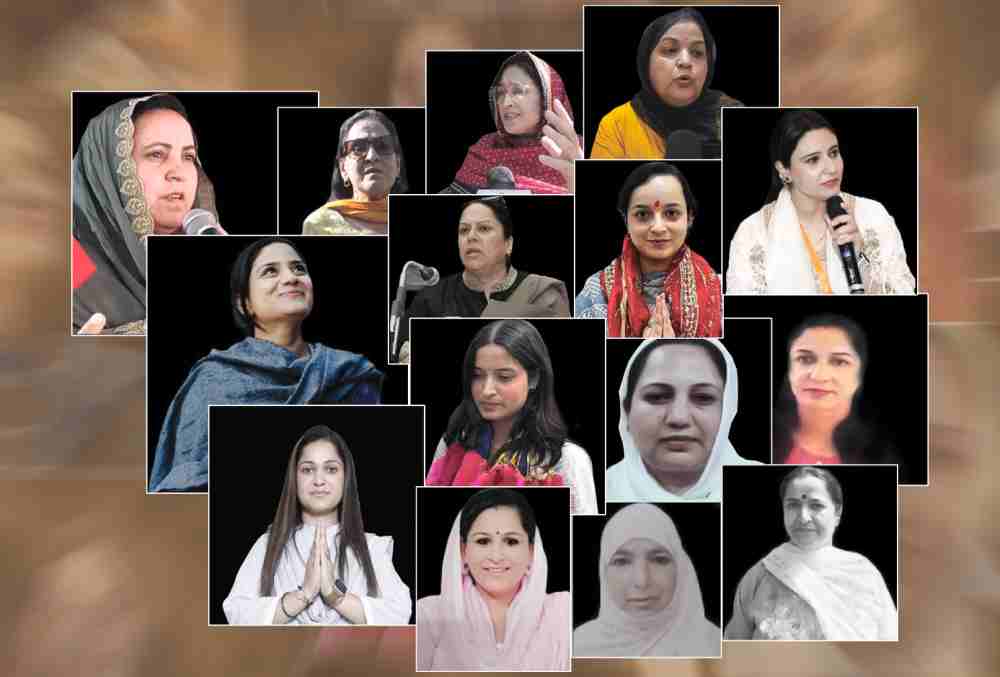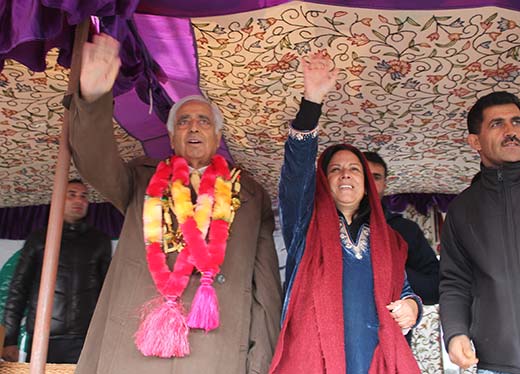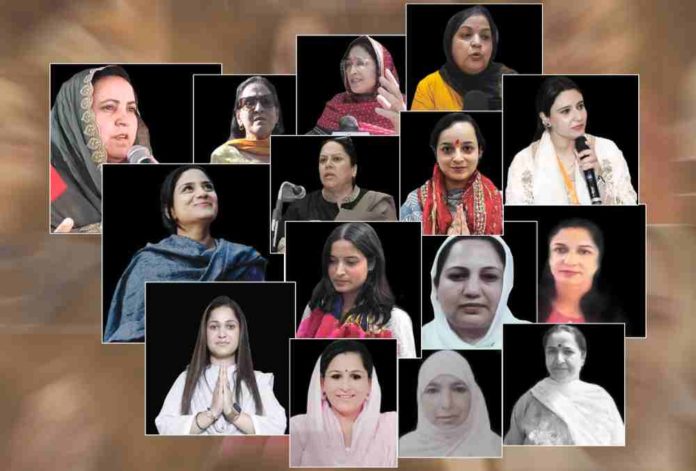In a stark revelation of Jammu and Kashmir’s gender disparity, only 35 of 873 candidates running for 90-seat assembly elections are female candidates. Umaima Reshi talks to some of them to understand their concerns and priorities

Being half of the population and having too many reservations is not helping women in Jammu and Kashmir to be active participants in politics. Of 873 candidates in the contest for 90 berths, only 35 women are making up only 4.1 per cent of the people in the race for an assembly that has compromised its status in the last five years.
While 18 women are contesting independently, 17 were fielded by registered and unrecognised political parties. Quite a few have the potential of making it to the Jammu and Kashmir assembly. Mehbooba Mufti who was the last Chief Minister of Jammu and Kashmir state is the most known female politician but is not contesting the elections for the Union Territory Assembly.
Sakeena Itoo
Sakeena Itoo of the Jammu and Kashmir National Conference (JKNC) is the most senior politician in the fray. A former Cabinet Minister, she is contesting from Damhal, Hanjipura (Noorabad). She joined politics after giving up her medical school to reclaim her assassinated father’s legacy.
“Dr Farooq Abdullah appointed me as Tourism Minister, and since then, we have worked tirelessly to develop our region,” she said. She is hopeful of winning her seat. The people of Noorabad and Dehpura have made their choice clear. In the last parliamentary election, the National Conference received 18,000 votes, and the results speak volumes.”
Admitting the 2024 election has seen relatively low female participation, Sakina expressed confidence in women’s potential. “Our women possess immense potential to excel in politics. They can make informed and impactful decisions, though unfortunately, they have not yet fully stepped forward,” she said. “Our party has reserved five seats specifically for women to encourage their active participation. Wherever I travel, I find women deeply connected to our movement.”
Her father, Wali Mohammad Ittoo, the erstwhile Speaker of Jammu Kashmir assembly, aspired her to be a doctor. After his assassination, she decided to contest in 1996. “I campaigned for 14 days, covering 136 villages on foot,” she recalled. “I was relatively unknown, having studied outside Kashmir. But when people learned that I was Itoo Sahib’s daughter, they welcomed me warmly.”
After stepping into her father’s shoes, Sakina has lost only the 2014 election and intends to retrieve it this time.
Asiya Naqash
A law graduate from Kashmir University, Asiya Naqash joined People’s Democratic Party (PDP) in 2005 and contested elections in 2008 and 2014. She won Hazratbal in 2014 and became a minister.

Pic: Bilal Bahadur
Now, when Naqash campaigned for retaining the berth, which changed enormously by the last delimitation, she landed up in new concerns. Unemployment tops her list of public concerns. “There is alienation and frustration, especially among youth and parents,” she said, asserting the “inflated” power tariff bills and poor water supply have compounded these issues.
She highlights the neglected infrastructure in the city’s inner areas. The poor road conditions, Naqash noted, are causing health problems due to dust and pollution.
Naqash believes in establishing small, employment-generating units for both men and women. These, she argued, are more effective than large-scale projects that often face delays.
Iltija Mufti
Her mother’s daughter, PDP’s Iltija Mufti made a debut in politics by contesting from Srigufwara Bijbehara. She describes politics candidly as a “dog-eat-dog world” where friendships and rivalries are fleeting.
“My mother is not Queen Elizabeth, and I am not Queen Victoria,” she said when asked about inheriting politics. “We do not sit on golden chairs bowing our heads in shame.”
Iltija acknowledges that PDP is perceived as a threat, leading to its feelings of insecurity and the snubbing. However, she emphasises that both the India Alliance and the People’s Alliance for Gupkar Declaration (PAGD) are the result of her mother Mehbooba Mufti’s initiative.
“Currently, we have no chief minister from our party, and no family legacy to lean on,” she admits, highlighting the challenges PDP faces. Despite this, Iltija is confident she will win the election, having worked to earn people’s trust in a challenging environment.
Despite being a third-generation Mufti in politics, she believes she is different from the Abdullahs’. Her family’s rise in politics, she said was earned through struggle. Iltija recalls speaking out five years ago when most leaders hid. Now, as she enters politics, she acknowledges questions about her family’s past actions. “I do not have a clean slate,” she admitted, recognising both positives and negatives.
On practical issues, Iltija advocates for improved infrastructure and basic services in Jammu and Kashmir. She proposes constructing tunnels to enhance connectivity and empower women through skill centres. “Every woman dreams of being self-sufficient,” she asserted, promising funds for resources like sewing machines and laptops.
Reena Chowdhary
Already in politics for six years, Reena Chowdhary is contesting independently in Samba. An MBA from Jammu University, she entered politics after giving up her “successful” Delhi-based event management company. Chowdhary felt encouraged when she won the last panchayat elections.
Women’s empowerment and safety are Chowdhary’s top priorities. She aims to address employment issues in Samba’s local industries, where despite promises of 80 per cent local labour, only 5-10 per cent of workers are natives. She seeks to ensure the promised 80 per cent local staffing and eliminate the exploitative thekedari system, an outsourcing system that supplies labour to industry.
Chowdhary also plans to tackle water scarcity, electricity shortages, and poor road connectivity. She intends to implement youth development programmes, offering job training and orientation sessions for private-sector employment. Her manifesto includes open gyms and sports facilities to promote local youth’s physical well-being.
Sunita Turki
Sunita Turki, a National Democratic Party candidate for Jammu North seat, she has been involved in politics for three years and also runs a school. “As a woman, I felt a strong desire to make a difference for other women,” she explained.
Turki’s primary focus is on woman empowerment. She believes that enhancing the safety and education of women is crucial. Women’s safety is a particular concern, she said. “We still do not feel safe when women are out, and that needs to change.”
Improving women’s access to education is also key to her vision. Turki believes that greater educational opportunities will empower women to thrive in society. The state of education in government schools is another concern. While government schools have adequate infrastructure and facilities, she said, the quality of education is poor. “I am aware of the challenges in the education sector and hope to bring about meaningful change.”
People, in her area, travel to the medical college for treatment and she aims to improve access to healthcare facilities.
Tanveer Fatima
Running from Sopore, Tanveer Fatima, B Com, is contesting independently. Her uncle served as an MLA in the 1960s and she is the second member of her family to contest. She was teaching in a private school earlier.
Fatima believes that women’s participation in Kashmir’s politics is crucial, given the field’s male dominance. As she prepares to contest, she has observed negative aspects, particularly the prevalence of deceit. She noted that many men tend to underestimate women’s intelligence and often try to deceive them. However, she feels that women are treated with the same respect as men in politics, and the public makes little distinction between male and female politicians.
Fatima points out that there are misconceptions about women’s capabilities. Having observed the situation in Sopore for 25 years, she has seen little development despite several elections. “Sopore has great potential for trade, especially in the fruit and fish markets, but it lacks the necessary infrastructure to support this industry,” she said.
Fatima’s decision to contest is driven by a desire to bring “positive change” to Sopore, particularly by improving facilities for traders. She regularly visits 40 surrounding villages and highlights the need for better infrastructure to accommodate them.
Daisy Raina
Daisy Raina, from Republican Party of India (Athawale) is contesting an independent candidate from Rajpora region, and hails from the esteemed Munshi dynasty of Srinagar. A Kashmiri Pandit who spent 30 years in Delhi, Raina returned to Kashmir in 2020, served as a Sarpanch and is now contesting for assembly.
Her family has political background. Her brother was a JKNC member in the 1980s, and her grandfather served the Congress party. However, it was her father-in-law who recognised her meaningful work in Kashmir, inspiring her to establish a farm and engage with locals.
Raina aims to amplify the voices of the silenced, deprived, unemployed, and those struggling with bureaucracy. She pledges to represent overlooked struggles in the assembly. Her top priorities are eradicating poverty and restoring harmony between Kashmiri Hindus and Muslims, reviving the region’s renowned peaceful coexistence.
Acknowledging the region’s tumultuous past, Raina stresses moving forward and promoting the “new Kashmir”. “Vote for me to demonstrate the strength of Kashmiri brotherhood to the world.” She seeks the people’s backing, not wealth.
Nighat Parveen
A single mother, Nighat Parveen is running independently from Baramulla. Her political journey began when she contested the 2018 election and served as a councillor. As a councillor, she worked hard to bring much-needed improvements to her area.
She feels her town has often been neglected by previous leaders. “The neglect by the government, along with my concerns over the rising cases of domestic violence, pushed me to take this step,” she said. She shared her story to explain what women suffer. She was married off when she was in the ninth grade and continued her studies after marriage. When she became a single mother, she found little support. This experience drove her to become a voice for other women in similar circumstances.
For five years, Nighat worked as a councillor and saw the decline of society closely. Despite 70 years of promises, roads, lighting, and housing conditions remained unchanged. She is determined to bring real progress to Baramulla, envisioning more than just a “smart city”—a place where people, especially women, can thrive.
She is particularly concerned about the challenges young girls face, especially drug addiction, joblessness and inability to get married and raise families.
Meenakshi Bhagat
Contested on Bahujan Samaj Party mandate from Bhadarwah, Meenakshi Bhagat, 25, hails from Indrala, Kandu. A chemical engineer from NIT Srinagar, Bhagat cites her father’s community involvement as inspiration. “He is a social worker, dedicated to helping people,” she said. “Growing up, I was inspired by his selflessness and wanted to do something meaningful for my people.” Bhagat’s campaign is self-funded and resource-deficient.
Visiting villages revealed widespread issues: poor roads, inadequate schools, and lacking medical facilities. Bhagat highlighted women’s struggles, especially due to alcohol consumption, and financial constraints limiting girls’ education.
Her priorities include addressing women’s issues, children’s health, and education. Bhagat emphasised raising awareness about basic rights, particularly among girls. “Girls must know their rights and that authorities support them,” she said.
Bhagat revealed receiving offers to withdraw from the election for large sums but refused. “We are here to serve the people,” she stated. “Our focus is on their development. After five years, our work will speak for itself.”
Santosh Labroo
Historically, Haba Kadal is the only assembly segment in Kashmir where Kashmiri Pandits have too many votes. That is perhaps why six out of 14 contestants in this seat are Kashmiri Pandits. One of them is Santosh Labroo contesting for J&K All Alliance Democratic Party. Originally from HabbaKadal, Labroo’s interest in politics emerged through school debates and later at Kashmir University, where she completed an MA in History. She has run a school in Sheeshbagh.
Labroo expressed dissatisfaction with the failure of other political parties to deliver for the underprivileged. Despite 70 years of governance, many remain jobless and uneducated, trapped in a flawed system. Her political involvement began with a sense of duty towards these communities, particularly the poor and displaced.
Labroo has spent time in Baramulla, witnessing the struggles of both Kashmiri Pandits and Muslims. She currently divides her time between Jammu, Srinagar, and Baramulla, emphasising her commitment to helping locals, particularly labourers and uneducated people, who are often deprived of opportunities. Local labourers should have access to jobs, she argued, rather than outsiders being brought in.
Labroo focuses on the specific challenges women face. She claims to be fearless, moving around Baramulla without an escort, believing that,“pure intentions are enough to ensure safety.” With over seven years of involvement in the women’s movement, she has worked extensively in migrant camps, where displaced people live in dire conditions.
Dr Preeti Bhagat
Dr Preeti Bhagat, an independent candidate from Suchetgarh, brings a wealth of experience to the table. With an MBBS and MD under her belt, she served as a senior resident at GMC Jammu until 2022. Dr Bhagat made the bold decision to leave her job to become more socially and politically active. “I left my job to become more socially and politically active,” she explained.
Dr Bhagat has crafted a 15-point agenda tailored to address the unique needs of this border region, renowned for its Basmati rice, a world-famous variety with a GI tag. Her manifesto prioritises farmers’ welfare, advocating for the abolition of electricity bills for farmers and timely provision of seeds and fertilisers, particularly during the critical paddy season.
Suchetgarh’s farmers face significant challenges due to unreliable electricity supply, which hampers irrigation and severely affects crops. Dr Bhagat aims to provide free electricity during the paddy season and ensure essential agricultural inputs are delivered on time.
Another key focus of her campaign is land rights. Dr Bhagat seeks to resolve discrepancies and confusion created by the current government regarding ownership rights for displaced populations. She also prioritises women’s education, career opportunities, and empowerment, encouraging independence from patriarchal figures.
To tackle unemployment, Dr Bhagat plans to develop an eco-friendly industrial hub in Suchetgarh, creating jobs for young people. Leveraging her medical experience, she proposes establishing a 24/7 community health centre to address healthcare obstacles stemming from poor transport connectivity. She also aims to establish a degree college in Suchetgarh.
Nilofar Sajad Gandru
Nilofar Sajad is a homemaker with a 10+2 education. She is contesting independently from Pulwama. She said she was always drawn to politics. “I was briefly involved in student politics… it has always been in the back of my mind that I would one day enter politics,” she said.
Her primary motivation is the plight of Kashmir and its people, particularly the youth. Kashmiris are enduring immense suffering and trauma, she said. “I need the support of the people,” she said. “I urge them to vote for truth, to elect someone who will listen to them and work effectively for their benefit.”
Fat power tariff bills and, installation of smart meters are her key concerns. Nilofar noted that Kashmir’s struggling economy makes it impossible for residents to pay these bills on time. She regrets the region’s rich resources – water and electricity, have limited access to natives. “We need these resources to be available to us, and we should be able to use them without restrictions,” she argued.
Nilofar expresses concern about the lack of opportunities for highly educated youth, particularly women. Many are forced to work in small shops despite their qualifications. “They deserve good jobs,” she said. “Every young person aspires to receive a good education and then secure meaningful employment, but they are being denied that opportunity.”
Meenakshi Kalra
Meenakshi Kalra, an independent candidate from Doda West, has a deep understanding of the region’s challenges. Raised in Jammu, where she did her graduation and Masters from Jammu University, Kalra relocated to the remote village of Dessa after marriage.
The revocation of Jammu and Kashmir’s statehood prompted Kalra to participate in the District Development Council elections. She observed that major parties were fielding “dummy candidates” with limited autonomy, which spurred her to stand as an independent. “I decided to represent Doda West, determined to bring real change,” she explained.
Kalra identifies several pressing issues. Despite the government’s Har Ghar Jal initiative, severe water shortages persist. The area also lacks road connectivity and street lighting. Outdated solar panels, provided for some panchayats, fail to meet the needs of the entire region.
The absence of roads disproportionately affects young girls’ education. Families often prioritize sons’ education, taking loans to fund it, while daughters are viewed as burdens and denied opportunities.
Gulshan Akhter
Gulshan Akhter is another independent candidate contesting from Anantnag West. Born in Palapur, Dialgam, Akhter is MA (Economics), Bed. She was driven to politics by a deep understanding of the struggles of the poor.
“I have committed to serving these underprivileged people and ensuring the happiness and well-being of the common folk,” she explained. Akhter’s interest in politics was sparked by speeches from prominent women politicians. An erstwhile aspirant for IAS, she would often listen to their speeches and write about what she heard.
Akhter is particularly concerned about educated youth from poor families who lack adequate financial support. She aims to engage them and eradicate unemployment in the region.
Akhter also desires to fight for women’s rights and address societal challenges. “My vision is to make education easily accessible to all,” she said. Her commitment to serving the underprivileged and empowering women drives her campaign.


